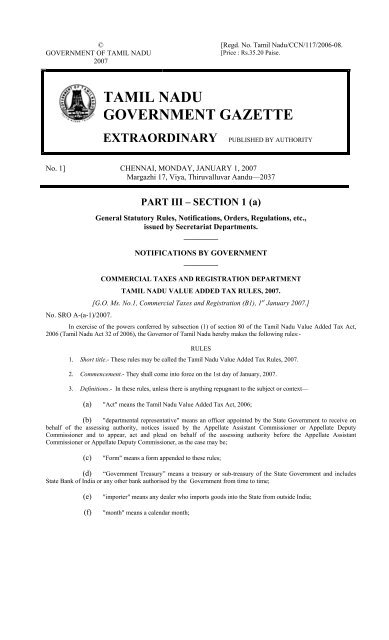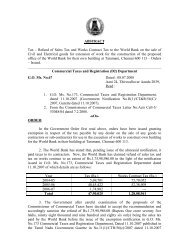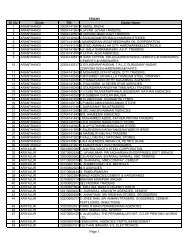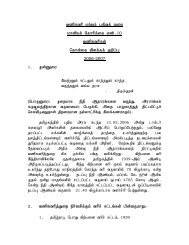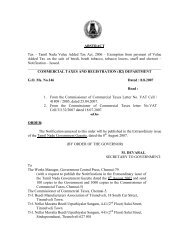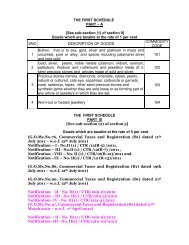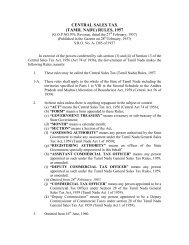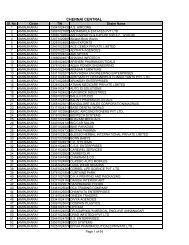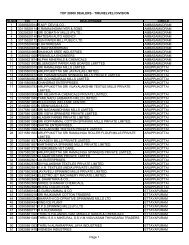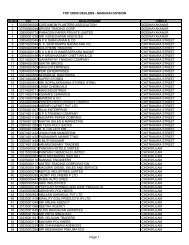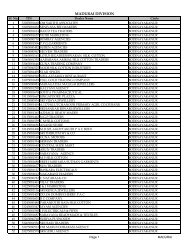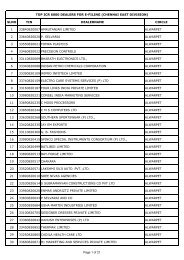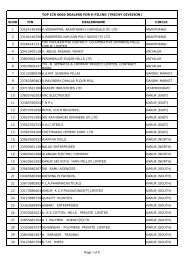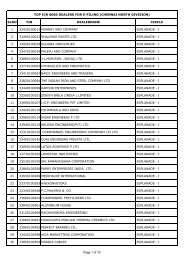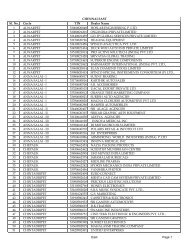The Tamil Nadu VAT Rules, 2007
The Tamil Nadu VAT Rules, 2007
The Tamil Nadu VAT Rules, 2007
Create successful ePaper yourself
Turn your PDF publications into a flip-book with our unique Google optimized e-Paper software.
©GOVERNMENT OF TAMIL NADU<strong>2007</strong>[Regd. No. <strong>Tamil</strong> <strong>Nadu</strong>/CCN/117/2006-08.[Price : Rs.35.20 Paise.TAMIL NADUGOVERNMENT GAZETTEEXTRAORDINARY PUBLISHED BY AUTHORITYNo. 1] CHENNAI, MONDAY, JANUARY 1, <strong>2007</strong>Margazhi 17, Viya, Thiruvalluvar Aandu—2037PART III – SECTION 1 (a)General Statutory <strong>Rules</strong>, Notifications, Orders, Regulations, etc.,issued by Secretariat Departments._________NOTIFICATIONS BY GOVERNMENT_________COMMERCIAL TAXES AND REGISTRATION DEPARTMENTTAMIL NADU VALUE ADDED TAX RULES, <strong>2007</strong>.[G.O. Ms. No.1, Commercial Taxes and Registration (B1), 1 st January <strong>2007</strong>.]No. SRO A-(a-1)/<strong>2007</strong>.In exercise of the powers conferred by subsection (1) of section 80 of the <strong>Tamil</strong> <strong>Nadu</strong> Value Added Tax Act,2006 (<strong>Tamil</strong> <strong>Nadu</strong> Act 32 of 2006), the Governor of <strong>Tamil</strong> <strong>Nadu</strong> hereby makes the following rules:-RULES1. Short title.- <strong>The</strong>se rules may be called the <strong>Tamil</strong> <strong>Nadu</strong> Value Added Tax <strong>Rules</strong>, <strong>2007</strong>.2. Commencement.- <strong>The</strong>y shall come into force on the 1st day of January, <strong>2007</strong>.3. Definitions.- In these rules, unless there is anything repugnant to the subject or context—(a) "Act" means the <strong>Tamil</strong> <strong>Nadu</strong> Value Added Tax Act, 2006;(b) "departmental representative" means an officer appointed by the State Government to receive onbehalf of the assessing authority, notices issued by the Appellate Assistant Commissioner or Appellate DeputyCommissioner and to appear, act and plead on behalf of the assessing authority before the Appellate AssistantCommissioner or Appellate Deputy Commissioner, as the case may be;(c)"Form" means a form appended to these rules;(d) “Government Treasury” means a treasury or sub-treasury of the State Government and includesState Bank of India or any other bank authorised by the Government from time to time;(e)(f)"importer" means any dealer who imports goods into the State from outside India;"month" means a calendar month;
TAMIL NADU GOVERNMENT GAZETTE EXTRAORDINARY2========================================================================(g)“section” means a section of the Act; and(h) “State representative” means an officer of the Commercial Taxes Department appointed by theState Government to receive on their behalf notices issued by the Appellate Tribunal and to appear, act and plead onbehalf of the State Government before the Appellate Tribunal.4. Application for registration.— (1) Every dealer whose total turnover in respect of purchase and sale withinthe State in any year is not less than ten lakhs of rupees and every other dealer whose total turnover in a year is not lessthan five lakhs of rupees shall submit an application for registration under this Act to the registering authority in whosejurisdiction his principal place of business is situated, within thirty days from the date of commencement of the Act.(2) Any other dealer or person intending to commence business may, if he so desires, submit an application forregistration under the Act to the registering authority in whose jurisdiction his principal place of business is to besituated:Provided that if such dealer reaches a total turnover, as mentioned in sub-rule (1), he shall submit an applicationfor registration within thirty days on reaching the said turnover.(3) Notwithstanding anything contained in sub-rules (1) and (2), every dealer registered under sub-section (3)of section 7 of the Central Sales Tax Act, 1956 (Central Act 74 of 1956), every dealer residing outside the State or hisagent carrying on business in the State and every factor, broker, commission agent, or arhati, delcredere agent orauctioneer or any other mercantile agent, by whatever name called, and every dealer in bullion, gold, silver and platinumjewellery including articles thereof and worn out or beaten jewellery and precious stones, irrespective of the quantum ofhis turnover in such goods and every person who commences any such business after the commencement of the Act shallsubmit an application for registration under the Act to the registering authority in whose jurisdiction his principal placeof business is situated, within thirty days of the commencement of the Act or commencement of his business, as the casemay be.(4) Notwithstanding anything contained in sub-rules (1) and (2), every casual trader shall, irrespective of thequantum of his turnover, submit an application for registration under the Act to the registering authority of the area inwhich he effects the occasional transaction, within twenty-four hours of commencement of the said transaction.(5) Where a dealer who resides outside the State and has no fixed place of business in the State, sells, supplies ordistributes goods through an employee or a person other than an agent by whatever name called, such dealer shall beforecommencement of the said transaction file an application for registration to the Commissioner of Commercial Taxes orany officer authorised by the Commissioner of Commercial Taxes in this behalf, within twenty-four hours of his arrivalin the State.(6) Where a minor inherits an existing business or succeeds a dealer, the guardian, trustee or agent of such minorshall, within thirty days of such inheritance or succession, as the case may be, submit an application for fresh registrationunder the Act to the registering authority in whose jurisdiction his principal place of business is situated.(7) In cases mentioned in sub-section (4) of section 38, the successor to whole or part of the business shallunless he already holds a certificate of registration, within thirty days of the date on which he succeeds to the businesssubmit an application for fresh registration under the Act to the registering authority in whose jurisdiction his principalplace of business is situated.(8) Every registered dealer whose certificate of registration was in force under the <strong>Tamil</strong> <strong>Nadu</strong> General SalesTax Act, 1959 shall file an application in Form A along with a sufficiently stamped self addressed envelope to theregistering authority without payment of specified fee within fifteen days of the commencement of the Act.(9) Every application for registration shall be in Form A and accompanied by two recent passport sizephotographs, and sufficiently stamped self addressed envelope along with proof of payment of registration fee asspecified in sub-section (1) of section 39 within the period prescribed in this rule.Provided that the registering authority may entertain the said application for a further period of thirty days, if itis satisfied that the applicant has sufficient cause for not submitting the application within the prescribed period.(10) (a) Every partnership business shall furnish details regarding the partners in Form B to the registeringauthority along with application for registration.(b) If a partner retires without the partnership firm being dissolved, he shall furnish details in Form Cprescribed under this rule to the registering authority.5. Certificate of registration.— (1) (a) <strong>The</strong> registering authority shall, on receipt of application in Form A,acknowledge its receipt. <strong>The</strong> said authority on satisfying itself that the application is in order shall assign Taxpayer
TAMIL NADU GOVERNMENT GAZETTE EXTRAORDINARY3========================================================================Identification Number and issue certificate of registration in Form D within thirty days from the date of receipt of theapplication.(b) If for any defect in the application, the certificate of registration cannot be issued, the registeringauthority shall issue a notice to the applicant to show cause against rejection of the application within the period specifiedabove.(c) If the certificate of registration is not issued by the registering authority within thirty days from thedate of receipt of the application or if no notice is issued by the said authority within the said period, the applicant shallbe deemed to have been duly registered and in such cases the registering authority shall assign a Taxpayer IdentificationNumber within seven days on expiry of the said period.(2) <strong>The</strong> certificate of registration is not be transferable.(3) Whenever there is a change in constitution of business of the dealer, the said dealer, within thirty daysfrom the date of change in constitution shall furnish details of the change to the registering authority. <strong>The</strong> registeringauthority on satisfying itself, amend the certificate of registration accordingly.(4) (a) On dissolution of partnership firm, a copy of the deed of dissolution shall be furnished by allpartners to the registering authority within thirty days from the date of the dissolution.(b) When a registered dealer dies, his executor, administrator or other legal representative shall withinthirty days of his taking charge as such executor, administrator, or other legal representative furnish the details in Form Eprescribed under this rule to the registering authority.(5) (a) When a registered dealer opens a new branch, he shall apply to the registering authority along withthe proof of payment of fee as specified in sub-section (1) of section 39 within thirty days from the date of opening of thesaid branch and get his certificate of registration amended accordingly.(b) When a registered dealer changes the name and style of the business or shifts place of business, heshall intimate the fact to the registering authority within thirty days of such change and get his certificate of registrationamended accordingly.registration.namely:—(c) A registered dealer shall not keep his goods in any place not mentioned in the certificate of(6) <strong>The</strong> security required to be furnished by a dealer under the Act shall be in any of the following forms,(a) Immovable property along with the security bond in Form F.(b) Post Office or Savings Bank Deposit or National Savings Certificates duly pledged in favour of theregistering authority.(c) Any term deposits from Scheduled Banks / Nationalised Banks duly pledged in favour of theregistering authority.(d) Bank guarantee in Form G.(7) (a) Every registered dealer shall exhibit a name board in <strong>Tamil</strong> in the registered place of business,showing the name and style of the business with full address and that the said business is registered under the Act.Wherever other languages are used, the version in English shall be in the second place next to <strong>Tamil</strong> and followed by theversion in other languages, if any. <strong>The</strong> <strong>Tamil</strong> letters in the name board shall be bold and in the reformed script.(b) Every registered dealer shall also conspicuously exhibit the certificate of registration at the principalplace of business and also at the additional place of business or branch or godown or factory.6. Accounts.— (1) Every registered dealer under the Act shall maintain true, correct and complete account inink or electronic records in any of the languages specified in the Eighth Schedule to the Constitution of India or inEnglish showing the goods produced or manufactured, bought, sold, delivered or supplied.(2) (a) Every dealer shall maintain accounts showing purchases and sales.namely –(b) <strong>The</strong> purchase account maintained by registered dealer shall contain the following particulars,(i)(ii)Invoice No. and date with seller’s Taxpayer Identification Number;Description of the goods purchased;
TAMIL NADU GOVERNMENT GAZETTE EXTRAORDINARY4========================================================================(iii) Value of purchase of exempted goods;(iv) Value of the goods purchased from registered dealers with rate of tax;(v) Value of the goods purchased from unregistered dealers with rate of tax;(vi) Value of goods purchased from outside the State by issue of ‘C’ Forms as prescribedunder the Central Sales Tax (Registration and Turnover) <strong>Rules</strong>, 1957;(vii) Value of goods purchased from outside the State without issue of ‘C’ Forms;(viii) Value of goods purchased as specified in the Second Schedule;(ix) Value of goods received on stock transfer from principal or head office situated outsidethe State for sale;(x) Value of goods received on stock transfer from the principal within the State for sale;(xi) Value of goods imported;(xii) Value of goods returned;(xiii) Total tax paid on local purchases;(c) <strong>The</strong> sales or stock transfer account maintained by a registered dealer shall contain the followingparticulars, namely: -(i) Invoice No. and date with buyer’s Taxpayer Identification Number;(ii) Description of goods with quantity and value sold;(iii) Sale value of exempted goods ;(iv) Sale value realized out of stock received from the principal;(v) Value of goods under zero rated sale out of taxable purchases;(vi) Inter-State sales out of taxable purchases;(vii) Sale value of goods specified in the Second Schedule;(viii) Sale value of goods taxable at 1% with tax due;(ix) Sale value of goods taxable at 4% with tax due;(x) Sale value of goods taxable at 12.5% with tax due;(xi) Sale value of goods sold in the course of inter-State sale against ‘C’ Form as prescribedunder the Central Sales Tax (Registration and Turnover) <strong>Rules</strong>, 1957;(xii) Sale value of goods sold in the course of inter-state sales without ‘C’ Form;(xiii) Value of goods despatched to outside the State with Form F, as prescribed under CentralSales Tax (Registration and Turnover) <strong>Rules</strong>, 1957;(xiv) Value of goods despatched to outside the State without Form F;(xv) Value of goods returned;(xvi) Total tax due;(xvii) Tax payable:Provided that the purchase accounts and sales accounts maintained by a dealer who opted to pay tax under subsection(4) of section 3 or section 8 would suffice to contain the description, invoice number and the value of the goodspurchased or sold.(3) (a) Every registered dealer who manufactures or produces shall maintain a production–cum-stockaccount in Form H.(b) Every registered dealer who is a manufacturer or producer and purchases industrial inputs to usethem in manufacture of taxable goods shall issue a certificate to the seller containing the details of his TaxpayerIdentification Number, the details of goods purchased, details of goods manufactured and the name and address andTaxpayer Identification Number of the seller.(4) Every registered dealer shall issue bill or invoice for each sale in triplicate showing the particulars ofgoods and quantity sold with its value, one copy of which must be retained for check by the officials of the CommercialTaxes Department. <strong>The</strong> invoice shall contain the rate and tax charged, the Taxpayer Identification Number of the sellerand that of the buyer, in case the buyer is a registered dealer.(5) Every registered dealer, who effects sales through agents shall maintain the accounts of goods consignedon each occasion, agent-wise showing the particulars of name and full address of the agent, nature and quantity of goodsdespatched and details of the mode of despatch and delivery note. He shall also maintain the originals of the writtencontract, if any, entered into between him and the agent, office copies of the authorisation letter, consignment notes ordespatch advices, as the case may be, sent to the agent in respect of the goods despatched on each occasion.(6) (a) Every commission agent, broker, del credere agent, auctioneer or other mercantile agent, bywhatever name called, shall maintain-(i) a register showing the particulars of goods purchased or received for sale on each occasion, inrespect of each principal separately;
TAMIL NADU GOVERNMENT GAZETTE EXTRAORDINARY5========================================================================principal;separately;(ii)(iii)the original or copy of the written contracts, if any, entered into between the agent and thecopies of authorisations received by him to purchase or sell goods on behalf of each principal(iv) details of purchases or sales effected on behalf of each principal, showing the names ofcommodities, quantities and value of purchases or sales, and the tax due thereon;(v) copies of pattials, i.e., accounts rendered by the agent to the principal from time to time,showing the gross amount of the purchases or sales, deductions on account of commission and incidental charges and thenet amount payable to the principal.(b) Every such agent shall also furnish to the assessing authority concerned on or before the 20 th of eachmonth a statement in respect of each principal showing the turnover of purchases or sales effected on behalf of eachprincipal in the previous month, containing the following particulars, namely:-(i)(ii)(iii)(iv)Name and full address of the principal;Name and value of goods bought or sold, liable at different rates of tax;Amount of input tax paid or payable on purchases on behalf of the principal;Amount of output tax due on the turnover.(7) Every registered dealer, who is a manufacturer of jewellery, shall also maintain an order book showingthe particulars of name and address of customer placing order, date of order, weight of bullion or old jewels receivedfrom the customer and date of delivery of finished jewels. He shall also maintain the particulars of weight of bullionadded by him, if any, out of his own stock.(8) Every registered dealer, who opted to pay tax at the rate specified in section 6 shall maintain accountsshowing the details of contract with value and the payments received.(9) Every registered dealer, who claims input tax credit shall maintain an input tax adjustment account withthe following particulars, namely:-(a) Month ;(b) Input tax credit brought forward;(c) Input tax paid during the month;(i) at 1%;(ii) at 4%;(iii) at 12.5%;(d) Reversal of input tax credit;(e) Total input tax credit;(f) Ineligible input tax credit;(g) Net input tax credit claimed;(h) Output tax;(i) Advance tax adjusted including entry tax;(j) Tax payable.(10) Every registered dealer who claims input tax credit on capital goods shall maintain input taxadjustment account with the following particulars, namely:-(a) Month;(b) Date of commencement of commercial production;(c) Value of capital goods;(d) Rate of tax;(e) Tax paid;(f) Tax credit availed –First year (not exceeding fifty per cent)Second yearThird year.(11) Accounts maintained by a registered dealer shall be preserved by him for a period of five years fromthe date of assessment.7. Filing of returns.— (1) (a) Every registered dealer liable to pay tax under the Act, other than a dealer whoopted to pay tax under sub-section (4) of section 3 or section 6 or section 8 including agent of a non-resident dealer andcasual trader, shall file return for each month in Form I on or before 20th of the succeeding month, to the assessing
TAMIL NADU GOVERNMENT GAZETTE EXTRAORDINARY6========================================================================authority in whose jurisdiction his principal place of business or head office is situated. Such return shall beaccompanied by proof of payment of tax.(b) Every registered dealer who is liable to pay tax under sub-section (5) of section 3 shall file a returnin Form J on or before 20 th of the succeeding month to the assessing authority in whose jurisdiction his principal place ofbusiness or head office is situated. Such return shall be accompanied by proof of payment of tax:Provided that a registered dealer specified in clause (a) or (b), whose taxable turnover in the preceding year istwo hundred crores of rupees and above, shall file the above returns on or before 12 th of the succeeding month to theassessing authority in whose jurisdiction his principal place of business or head office is situated. Such return shall beaccompanied by proof of payment of tax:(c) <strong>The</strong> option exercised under sub-section (4) of section 3 of the Act shall be final for the financialyear and such option shall be exercised within thirty days from the date of commencement of the Act or commencementof his business whichever is later.(d) Every registered dealer who opts to pay tax under sub-section (4) of section 3 shall file a return foreach month in Form K on or before 20th of the succeeding month to the assessing authority along with proof of paymentof tax.(e) Every registered dealer who opts to pay tax under section 6 or section 8 shall file a return for eachmonth in Form L on or before 20 th of the succeeding month to the assessing authority along with proof of payment of tax.(2) Every principal or head office shall include the turnover relating to the goods consigned to the agent andfile a return in Form I for each month on or before 20 th of the succeeding month with the particulars of name and fulladdress of the agent, value of the goods sold or purchased, tax collected on sale and tax paid on purchase by the agentalong with proof of payment of tax.(3) Every branch or agent of a dealer shall file a return in Form I, on or before the date on which the headoffice or his principal has to file return, for the preceding month, to the assessing authority under whose jurisdiction hecarries on business.(4) Every department of Government liable to pay tax under the Act shall file a statement in Form Mshowing the total and taxable turnover for each quarter on or before 20 th of the month succeeding the quarter along withproof of payment of tax.(5) Every dealer liable to pay tax under the Act shall file return in duplicate:Provided that such category of dealers as may be directed by the Commissioner shall file returns electronicallyor in ICR form supplied by the Government.(6) If a dealer receives or returns in any year any amount due to price variation, he shall within thirty daysfrom the end of the year submit a return in Form N to the assessing authority.8. Procedure for assessment.— (1) In pursuance of Explanation II to clause (41) of section 2, the amountsspecified in the following clauses shall not, subject to the conditions specified therein, be included in the turnover of adealer –(a) all amounts refunded to purchasers in respect of goods returned by them to the dealer, provided theaccounts show the date on which the goods were returned and the date on which and the amount for which refund wasmade or credit was allowed to the purchaser.(b) all amounts received from the sellers in respect of goods returned to them by the dealer, providedthe accounts show the date on which the goods were returned and the date on which and the amount for which refund wasreceived or advice of credit was received from the seller.(c) all amounts charged separately as interest on the unpaid amount payable or finance charges in thecase of hire purchases or any such system of payment by instalments.(2) While determining the taxable turnover, in respect of a dealer other than those who opted to pay taxunder sub-section (4) of section 3, section 6 and section 8, the post sale charges and the amounts specified in thefollowing clauses shall, subject to the conditions specified therein be deducted from the total turnover of a dealer –(a) all amounts for which goods specified in the Fourth Schedule to the Act are sold;(b) all amounts for which goods exempted by a notification issued by the Government under section 30are sold or purchased, as the case may be, provided the terms and conditions, if any, for the exemption in thenotification are complied with.
TAMIL NADU GOVERNMENT GAZETTE EXTRAORDINARY7========================================================================(3) In making an assessment under section 24, the assessing authority shall take into account such of thefollowing factors as may be relevant to the determination of the prevailing market price of the goods, namely:--(a) <strong>The</strong> price charged by other dealers at the relevant stage of sale of similar goods during the relevantperiod;(b) <strong>The</strong> difference between the price charged by a dealer towards the purchase of the goods from theearlier seller and the price charged on the resale of the same goods;(c) <strong>The</strong> difference between the price paid by the dealer towards the purchase of the goods from theearlier seller and price charged for the resale of the same goods; and(d) <strong>The</strong> differential price charged on sales against bulk orders and small orders in respect of the samegoods. If the difference in prices, exclusive of the tax element, is more than fifteen per cent (15%), the assessingauthority shall examine the reasons for the variation, taking into account the relationship between the parties to thetransactions, the charges for after sales services, packaging, transport and other expenses incurred by subsequent sellerswhich add to the cost of the goods at each stage of sale by successive dealers. <strong>The</strong> assessing authority shall also examinewhether there is such difference in the price charged on the sales of the same goods to different customers and whetherthe goods are made available to all distributors or other customers in unlimited quantities and at the same prices. Aftermaking due allowance towards the variation in prices and normal profit margin, the assessing authority shall arrive at themarket price that should have been charged by the dealer and levy tax on the taxable turnover so arrived at.(4) On receipt of the return in Form N, the assessing authority shall pass orders –(a) demanding the tax payable on the amount received due to price variation and shall serve upon thedealer a notice in Form O; or(b) refunding the tax due on the amount returned and shall serve upon the dealer a notice in FormP.(5) <strong>The</strong> taxable turnover of the dealer liable to pay tax under section 5 on transfer of property in goodsinvolved in the execution of works contract shall be arrived at after deducting the following amounts from the totalturnover of that dealer, namely:-(a) All amounts involved in respect of goods involved in the execution of works contract in the courseof export of the goods out of the territory of India or in the course of import of the goods into the territory of India or inthe course of inter-State trade or commerce;(b) All amounts relating to the sale of any goods involved in the execution of works contract which arespecifically exempted from tax under the Act;(c) All amounts paid to the sub-contractors as consideration for execution of works contract whetherwholly or partly:Provided that no such deduction shall be allowed unless the dealer claiming deduction, produces proof that thesub-contractor is a registered dealer liable to pay tax under this Act and that the turnover of such amount is included inthe return filed by such sub-contractor;(d) All amount towards labour charges and other charges not involving any transfer of property ingoods, actually incurred in connection with the execution of works contract, or such amounts calculated at the ratespecified in column (3) of the Table below, if they are not ascertainable from the books of accounts maintained andproduced by a dealer before the assessing authority.THE TABLE.Labour or other charges as a percentage value ofSl.No.Type of works contractthe works contract(1) (2) (3)1. Electrical Contracts 152. All structural contracts 153. Sanitary contracts 254. Watch and / or clock repair contracts 505. Dyeing contracts 506. All other contracts 30(e) all amounts, including the tax collected from the customer, refunded to the customer or adjustedtowards any amount payable by the customer, in respect of unexecuted portion of works contract based on the correctionson account of measurements or check measurements, subject to the conditions that—(i) the turnover was included in the return and tax paid; and
TAMIL NADU GOVERNMENT GAZETTE EXTRAORDINARY8========================================================================(ii) the amount including the tax collected from the customer is refunded or adjusted, within a periodof six months from the due date for filing of the return in which the said amount was included and tax paid.(6) After assessment or revision of assessment under sections 22, 24, 27, 28 or 29 of the Act, the assessingauthority shall serve on the dealer a demand notice in Form O, after adjusting the eligible input tax credit. If the tax dueon assessment or revision of assessment, after adjustment of eligible input tax credit, is lower than the tax already paid,the assessing authority shall serve upon the dealer a notice in Form P, informing the dealer of the adjustment of excesstax towards the arrears or the refund of the amount, as the case may be.(7) <strong>The</strong> declaration that an identical question of law is pending before the High Court or the Supreme Courtreferred to in sub-section (1) of section 23 shall be in Form Q.9. Tax deduction at source.— (1) Any person who makes a deduction under section 13, shall deposit the sumso deducted to the assessing authority having jurisdiction over the person or to any other authority authorised by theDeputy Commissioner to receive such payment, on or before the 20th day of the succeeding month in which thededuction was made with a statement in Form R.(2) <strong>The</strong> certificate that a dealer has no liability to pay or has paid the tax under section 5, referred to inclause (b) of the first proviso to sub-section (1) of section 13 shall be in Form S.(3) <strong>The</strong> certificate of deduction of tax referred to in sub-section (3) of section 13 shall be in Form T.(4) <strong>The</strong> notice in writing, indicating the amount payable under the Act, referred to in sub-section (5) ofsection 45 shall be in Form U.10. Input tax credit .— (1) <strong>The</strong> input tax credit that can be deducted from the output tax payable for any monthor year shall be calculated by using the formula (A + B) - (C + D)Where,A = Input tax credit carried forward from the previous month or yearB = Input tax credit accrued during the month or yearC = Input tax credit reversed during the month or yearD = Input tax credit refunded during the month or year(2) Every registered dealer who claims input tax credit under sub-section (1) of section 19 shall, producethe original tax invoice, in support of his claim of the input tax credit, containing the following details, namely:-(a)(b)(c)(d)(e)(f)(g)(h)(i)A consecutive serial number;<strong>The</strong> date on which the invoice is issued;<strong>The</strong> name, address and the Taxpayer Identification Number of the seller;<strong>The</strong> name, address and the Taxpayer Identification Number of the buyer;<strong>The</strong> description of the goods;<strong>The</strong> quantity or volume of the goods;<strong>The</strong> value of the goods;<strong>The</strong> rate and amount of tax charged; and<strong>The</strong> total value of the goods.(3) (a) Every registered dealer, other than those who opt to pay tax under sub-section (4) of section 3 orsection 6 or section 8, who claims input tax credit for other than capital goods purchased on or after 1 st January 2006held in stock on the commencement of the Act, shall submit a stock inventory statement in Form V in duplicate alongwith photostat copy of related purchase invoice or bill within thirty days from the date of commencement of the Act.(b) In the case of claim of input tax credit for other than capital goods purchased on or after 1 st January2006, held in stock on the commencement of the Act ,––(i) Where the purchase has been effected from first seller in the State with invoice or bill showingthe tax separately, the claim for input tax credit shall be allowed to the extent of the tax paid by him on the value of suchgoods;(ii) Where the purchases have been effected from second and subsequent dealer, the claim forinput tax credit shall be restricted to the extent of the tax calculated on the purchase value of goods after deducting fifteenper cent and by using the tax fraction formula at the rate specified in the relevant Schedule under the said Act.<strong>The</strong> tax fraction formula is,t x r
TAMIL NADU GOVERNMENT GAZETTE EXTRAORDINARY9========================================================================---------r + 100where 't' is taxable sale inclusive of tax and'r' is the rate of tax applicable to the sale.<strong>The</strong> dealer who claims input tax credit under this sub-rule shall furnish separate statement.(iii) If the goods taxable under the <strong>Tamil</strong> <strong>Nadu</strong> General Sales Tax Act, 1959 are exempted under theAct, no input tax credit shall be allowed;(iv) Where any tax is paid on any goods at the point of purchase by the dealer himself, such tax shall beeligible for claiming input tax credit;(v) Every registered dealer shall avail the input tax credit immediately after the submission of stockinventory statement in From V by him. Such claim shall be availed within six months from the date of commencementof the Act. <strong>The</strong> unavailed input tax credit, if any, after six months shall lapse to Government.(vi) <strong>The</strong> assessing authority shall verify the claim made by the registered dealer with reference todocuments filed along with the stock inventory in From V and pass an order within ninety days from the date of receiptof the same, determining the amount for which the registered dealer is entitled to input tax credit and reverse the claim,wherever necessary.(vii) A registered dealer, who effects zero rated sale shall not be entitled for input tax credit relating tothe stock held on the date of commencement of the Act.(viii) <strong>The</strong> registered dealer shall ordinarily keep all original purchase invoices and connected documentsrelating to the claim for input tax credit under this rule, for a period of five years from the date of commencement of theAct and shall produce such documents to the authority for scrutiny, if required.(4) (a) <strong>The</strong> registered dealer who claims input tax credit on capital goods under clause (b) of sub-section(3) of section 19, shall within thirty days from date of commencement of commercial production intimate the said date tothe assessing authority under whose jurisdiction his principal place of business is situated.(b) In respect of capital goods purchased within the State, the registered dealer shall be entitled to availupto fifty per cent of the input tax credit in the same financial year and the balance of the input tax credit before the endof the third financial year, provided the said capital goods are in possession of the dealer. After the expiry of the thirdfinancial year, the unavailed input tax credit, if any, shall lapse to Government:Provided that a registered dealer who makes purchase of parts and accessories for capital goods alreadypurchased and use in manufacture of taxable goods is entitled to input tax credit relating to such goods in the month ofpurchase or thereafter.(c) <strong>The</strong> registered dealer shall not be entitled to claim input tax credit on the capital goods purchasedprior to the commencement of the Act.(d) A registered dealer who manufactures goods, the sales of which are exempted under Section 15 ofthe Act is not entitled to input tax credit.(5) Every claim made under clause (b) of sub-section (10) of section 19 shall be presented before theassessing authority within thirty days from the date on which the original tax invoice is lost. It shall be accompanied bya duplicate or carbon copy of the original invoice. <strong>The</strong> assessing authority shall verify such claim and pass ordersallowing input tax credit on the basis of duplicate or carbon copy of the original invoice or its rejection. When the claimis rejected, the assessing authority shall record his reasons for doing so and communicate to the dealer:Provided that no order prejudicial to the dealer shall be passed unless the said dealer is given an opportunity ofbeing heard.(6) (a) After availing input tax credit, if any, dealer who purchases goods returns the goods and getscredited the price and tax paid, the tax credit so availed shall be reversed, only when–(i) the purchase was included in the return; and(ii) the goods were returned within a period of six months from the date of purchase by him.(b) Where a dealer who sells goods after paying tax, receives back his goods, he may deduct such taxamounts paid from the tax payable in the returns of following months only when, -(i) in respect of sales return, -
TAMIL NADU GOVERNMENT GAZETTE EXTRAORDINARY10========================================================================(A)(B)(C)(D)the sale was included in the return and the tax paid;the goods were received back or returned within a period of six months from the date ofsale;the price of the goods and the tax, if any, charged thereon were refunded in full to thebuyer; andthe credit note shall contain the date and serial number of the invoice on which the taxwas originally charged and brought to account.(ii) in respect of unfructified sale,-(A)(B)(C)the sale was included in the return and tax paid; andthe goods were received back within a period of thirty days from the date of sale.Wherever any credit notes are to be issued for discount or sales incentives by any dealerto another dealer after issuing tax invoice, the selling dealer shall pass a credit notewithout disturbing the tax component on the price in the original tax invoice, so as toretain the quantum of input tax credit already claimed by the buying dealers as well as notto disturb the tax already paid by the selling dealer.(7) (a) <strong>The</strong> principal is entitled for the input tax credit on those purchases which are transferred to theagent and sold by the agent on behalf of him.of him.principal.(b) <strong>The</strong> principal is entitled for the input tax credit for those purchases effected by the agent on behalf(c) <strong>The</strong> agent is not liable to pay tax on the sale of those goodswhich were received by him from the(8) (a) <strong>The</strong> transferee claiming input tax credit under sub-section (14) of section 19 shall furnish thefollowing details, namely:-(i)(ii)(iii)(iv)Unavailed credit available in the account of the transferor as certified by a CharteredAccountant or Cost Accountant;Inventory of stock transferred with date;Details of capital goods transferred; andOriginal tax invoices evidencing the payment of tax at the time of purchase.(b) <strong>The</strong> assessing authority shall verify the correctness of the details furnished under clause (a), allowor determine the amount of input tax credit transferred to the dealer or reject the claim:heard.Provided that no order rejecting the claim shall be passed unless the dealer is given an opportunity of being(9) (a) Input tax credit on inter-state sales shall be allowed only if Form C prescribed in the Central SalesTax (Registration and Turnover) <strong>Rules</strong>, 1957 is filed.(b) Input tax credit on transfer of goods falling under section 6-A of the Central Sales Tax Act, 1956shall be allowed only if Form F prescribed in the Central Sales Tax (Registration and Turnover) <strong>Rules</strong>, 1957 is filed.(10) (a) In cases where the input tax paid in the month exceeds the output tax payable, the excess inputcredit shall be carried over to the next month.(b) In cases where the input tax credit as determined by the assessing authority for any registereddealer, for a year, exceeds the tax liability for that year, it may adjust the excess input tax credit against any arrears of taxor any other amount due from him If there are no arrears under the Act or after the adjustment there is still an excess ofinput tax credit, the assessing authority shall serve a notice in Form P upon such dealer.(11) <strong>The</strong> method of selection by the Commissioner referred to in sub-section (3) of section 22 shall be basedon suitable stratified random sampling method and such selection shall not exceed twenty per cent of the cases assessedunder sub-section (2) of section 22 and intimate the details of such selection to the assessing authority for detailedscrutiny of accounts. Such list shall be exhibited on the Notice Board of the assessment circles and also in the website ofthe department. <strong>The</strong> assessing authority shall call for the accounts of those assessees for detailed scrutiny and passappropriate orders.11. Refunds. – (1) <strong>The</strong> assessing authority shall issue refund of amount specified in Form P within ninety daysfrom the date of service of the said Form, failing which the assessing authority shall also pay the interest at the rateprescribed under the Act along with such refund amount.
TAMIL NADU GOVERNMENT GAZETTE EXTRAORDINARY11========================================================================(2) <strong>The</strong> dealer who claims refund due to sale effected by him under sub-section (1) of section 18 shall filean application in Form W to the assessing authority along with copies of invoices or bills of related purchases within onehundred and eighty days from the date of accrual of such claim. <strong>The</strong> assessing authority after verification of thecorrectness of the claim, shall issue refund within ninety days from the date of the receipt of the application in Form W.12. Interest. – (1) If the refund amount due to a dealer is not received by him within the period specified in subsection(5) of section 42, he shall make an application to the assessing authority claiming the interest payable by theGovernment.(2) (a) On receipt of the application, the assessing authority shall, after such enquiry as it may considernecessary for the purpose of verification of the eligibility of the dealer and the correctness of the claim made, issue anotice for the payment of the interest.(b) If on such enquiry, the assessing authority finds that the claim is not in order or that the amount ofinterest claimed is not admissible either in full or in part, it shall, after giving the dealer an opportunity of being heard,and for reasons to be recorded in writing, reject the claim or disallow such part of the claim.13. Appellate Tribunal. – (1) Of the two members of the Appellate Tribunal (other than its Chairman), one shallbe an officer of the Commercial Taxes Department of the State Government not below the rank of Joint Commissioner.<strong>The</strong> other member shall be –(a) an officer of the Indian Audit and Accounts Service; orTax; or(b) an officer of the Income-Tax Department not below the rank of Joint Commissioner of Income(c) an officer of the above cadre in Central Excise Department or Customs Department or RailwayAccounts Department or Defence Accounts Department; or(d) an outsider who is –(i) a member of the Institute of Chartered Accountant of India, and possess practical experienceof not less than five years as a Chartered Accountant; or(ii) a member of the Institute of Cost and Works Accountants of India and possess practicalexperience of not less than five years as a Cost Accountant.(2) Any Additional Member other than a judicial officer of the Appellate Tribunal appointed under subsection(2) of section 50 shall be an officer not below the rank of Deputy Commissioner of the Commercial TaxesDepartment of the State Government,14. Appeal and Revision.– (1) Every appeal preferred under sections 51 and 52 shall be in Form X and shall beverified in the manner specified therein. It shall be in duplicate and shall be accompanied by two copies of the orderappealed against one of which shall be a certified copy:Provided that the appellate authority may entertain the appeal, if it is satisfied that the appellant has sufficientcause for not furnishing the copies of the order appealed against(2) <strong>The</strong> appeal shall also be accompanied by proof of payment of fee of rupees one hundred.(3) If the Appellate Authority finds any defect or omission in the appeal, it shall return the appeal forrectification of the defect or for supplying the omission and re-presentation within ten days from the date of receipt by theappellant:Provided that where the appeal is re-presented after the expiry of the period of ten days, the appellate authorityconcerned may admit such petition, if re-presented within a further period of ten days and if it is satisfied that theappellant had sufficient cause for not re-presenting the appeal within the said period.(4) As soon as may be, after the registration of appeal, the Appellate Assistant Commissioner or theAppellate Deputy Commissioner shall set a date of hearing and shall send intimation thereof to the departmentalrepresentative. A copy of the memorandum of appeal and the order appealed from shall also be furnished to thedepartmental representative. It shall be the duty of the departmental representative to obtain the records of the case fromthe assessing authority and transmit them to the Appellate Assistant Commissioner or the Appellate DeputyCommissioner, as the case may be.
TAMIL NADU GOVERNMENT GAZETTE EXTRAORDINARY12========================================================================(5) On the date fixed for hearing or any other date to which the hearing may be adjourned, the appellantshall ordinarily be heard first in support of his appeal. <strong>The</strong> assessing authority or the departmental representative shall beheard next. <strong>The</strong> departmental representative shall file a written statement and the appellant shall be entitled to reply.(6) <strong>The</strong> order of transfer of appeal by the Chairman of the Appellate Tribunal under section 56 shall becommunicated to the appellant, to every other party affected by the order, to the authority against whose order the appealwas preferred and also to the Appellate Assistant Commissioner or the Appellate Deputy Commissioner havingjurisdiction.(7) Every application for revision under section 54 or section 57 shall be in Form Y and shall be verified inthe manner specified therein. It shall be in duplicate and shall be accompanied by two copies of the original order againstwhich it is filed, one of which shall be a certified copy:Provided that the revising authority may entertain the said application if it is satisfied that the applicant hassufficient cause for not furnishing copies of the said original order.(8) If the Deputy Commissioner or the Joint Commissioner finds any defect or omission in the revisionpetition, the Deputy Commissioner or the Joint Commissioner of Commercial Taxes, as the case may be, shall return thepetition for rectification of the defect or for supplying the omission and re-presentation within ten days from the date ofreceipt by the petitioner:Provided that where the revision petition is re-presented after the expiry of the period of ten days, the DeputyCommissioner or the Joint Commissioner of Commercial Taxes may admit such petition, if re-presented within a furtherperiod of ten days and if he is satisfied that the petitioner had sufficient cause for not re-presenting the revision within thesaid period.(9) If an appellant or a revision petitioner dies while the proceedings under sections 51, 52, 54 or 57, as thecase may be, are pending and such proceedings cannot be proceeded with unless the legal representative of the appellantor revision petitioner, as the case may be, is brought on record, the Appellate Assistant Commissioner or the AppellateDeputy Commissioner or the Deputy Commissioner or the Joint Commissioner of Commercial Taxes, as the case may be,shall adjourn further proceedings to enable the legal representative of the deceased appellant or revision petitioner, as thecase may be, to appear and apply for being made a party in the said proceedings. If the legal representative fails to do sowithin ninety days from the date on which the appellant or the revision petitioner dies, the appeal or revision petition, asthe case may be, shall abate as regards the deceased.(10) (a) Every appeal under sub-section (1) of section 58 to the Appellate Tribunal and memorandum ofcross-objection under sub-section (2) of section 58 to the Appellate Tribunal shall be in Form Z and Form AA,respectively, and shall be verified in the manner specified therein. <strong>The</strong> officer empowered under sub-section (1) ofsection 58 shall be the Deputy Commissioner concerned in respect of an order passed by the Appellate AssistantCommissioner under sub-section (3) of section 51 or by the Appellate Deputy Commissioner under sub-section (3) ofsection 52.(b) It shall be in quadruplicate and shall be accompanied by four copies of the order appealed against,one of which shall be a certified copy and also four copies of the order of the assessing authority.(c) Every such appeal other than an appeal preferred by the officer empowered under sub-section (1) ofsection 58, shall also be accompanied by a treasury receipt or a money receipt issued by the Department or crosseddemand draft or pay order of a Bank in support of having paid the fee calculated at the rate of two per cent of the disputedtax and penalty subject to a minimum of rupees five hundred only and a maximum of rupees two thousand only.(11) (a) Every application for review under clause (b) of sub-section (7) of section 58 to the AppellateTribunal shall be preferred in Form BB and shall be verified in the manner specified therein. Where the application ispreferred by the departmental authority, it shall be signed and verified in the manner aforesaid by the DeputyCommissioner concerned.(b) It shall be in quadruplicate and shall be accompanied by four copies of the order of the AppellateTribunal, one of which shall be a certified copy.(c) Every such application for review preferred by any party other than a departmental authority, beaccompanied by a treasury receipt or a money receipt issued by the Department or a crossed demand draft or pay order ofa Bank in support of having paid the fee calculated at the rate of two per cent of the disputed tax and penalty subject to aminimum of rupees five hundred only and a maximum of rupees two thousand only.(12) Every enhancement petition or petition for restoration under sub-section (5) of section 58 shall be inForm CC and shall be filed by the assessing authority or his authorized representative in quadruplicate and shall also beaccompanied by four copies of the order against which it is filed, one of which shall be a certified copy.
TAMIL NADU GOVERNMENT GAZETTE EXTRAORDINARY13========================================================================(13) (a) Every appeal under sub-section (1) of section 59 shall be in Form DD and every petition under subsection(1) of section 60 shall be in Form EE and shall be verified in the manner specified therein.(b) Every such appeal or petition shall be accompanied by a certified copy of the order of the JointCommissioner or the Appellate Tribunal, as the case may be.(14) (a) Every application for review under sub-section (6) of section 59 to the High Court shall be in FormFF and every application for review under sub-section (7) of section 60 to the High Court shall be in Form GG and shallbe verified in the manner specified therein.(b) Every such application shall be preferred within one month from the date of receipt of the ordersought to be reviewed.(15) Where it is provided in the Act that an appellant or an applicant in revision proceedings shall furnishsecurity in regard to the payment of tax or fee or other amount, the appellant or applicant or any person on his behalfshall furnish property security, along with a security bond in Form HH or a bank guarantee in Form G as the authoritybefore which the appeal or application is preferred may, in its discretion, direct. Where an appellant or an applicant inrevision proceedings or any person on his behalf furnishes immovable property as security, he may mortgage suchproperty to the Government by deposit of title deeds in any town which has been notified under sub-section (f) of section58 of the Transfer of Property Act, 1882 (Central Act IV of 1882). <strong>The</strong> security bond or the bank guarantee, as the casemay be, shall be filed in duplicate, the original of which shall bear appropriate adhesive non-judicial stamps or Court feestamps. In case the appeal or revision is fully allowed or remanded in favour of the appellant or applicant, the securitybond or the bank guarantee, as the case may be, shall be void and of no effect. Otherwise, it shall remain in force untilthe expiry of six months from the date of receipt of the appellate or revisional order by the appellant or applicant. <strong>The</strong>security bond shall thereafter be released by necessary endorsement on the original and returned to the appellant orapplicant. <strong>The</strong> Bank guarantee furnished shall become part and parcel of the records of the assessing or appellate orrevising authority and shall not be returned to the bankers or the appellant or the applicant. It shall be cancelled by theassessing authority an advice of cancellation sent to the appellant or applicant or bankers after the expiry of six monthsfrom the date of receipt of the appellate or revision order by the appellant or applicant. If a security bond had beenfurnished, it shall be released by necessary endorsement on the original and returned to the appellant or applicant and ifBank guarantee had been furnished, it shall be cancelled by the assessing authority and an advice of cancellation sent tothe appellant or applicant or bankers, on request by the appellant after the disposal of the appeal or earlier, if sufficientproof is produced that the entire amount for which stay has been granted is fully paid.(16) Where the appellant or applicant furnishes the security referred to in sub-rule (15) or any other form ofsecurity referred to in sub-rule (5) of rule 5, he shall file the security bond or the bank guarantee or other security to theassessing authority concerned. <strong>The</strong> appellant should obtain and file the duplicate copy of security bond with necessaryendorsement of assessing officer in Form HH for having executed the security or the duplicate copy of bank guarantee inForm G with necessary endorsement of the assessing officer for having filed the bank guarantee, before the appellate orrevising authority.(17) Every order of an appellate or revising authority under sections 51, 52, 54 and 57, as the case may be,shall be communicated to the appellant or revision petitioner, as the case may be, the respondent in each case and theauthority against whose order the appeal or revision was filed.(18) Every order passed on appeal, revision or review shall be given effect to by the assessing authority whoshall refund without interest within a period of ninety days from the date of order giving effect to such order passed inappeal, revision or review, any excess tax found to have been collected. For the said purpose, the assessing authorityshall serve upon the dealer a notice in Form P notifying the dealer of the adjustment of excess tax towards arrears, if any,or if there are no arrears of tax due under the Act from the dealer or if after such adjustment there is still an excess, theassessing authority shall refund the amount of the excess tax and along with such notice, he shall also send to the dealer avoucher for claiming refund of that amount without interest from the treasury. If any amount is found to be due from thedealer, the assessing authority shall serve upon the dealer a notice in Form O and the dealer shall pay the sum demandedin the manner specified in the notice.(19) Every order of the Deputy Commissioner under section 53 and of the Joint Commissioner undersection 55 shall be communicated to the dealer concerned, every other person affected by the order and to the authoritywhose order was the subject matter of the proceedings.(20) An order under this rule may be communicated by service on the person concerned or his authorisedrepresentative or by registered post with acknowledgement due or by affixture at the last known place of business orresidence, if service by the first two methods are not possible.(21) If the tax, as determined in appeal or revision is in excess of the power of assessment of the initialassessing authority, the appellate or revising authority shall transfer the original records of assessment to the appropriateassessing authority who shall have power to collect the tax due in the same manner, as if it were a tax assessed by itself.<strong>The</strong> appropriate assessing authority shall serve upon the dealer a notice in Form O and the dealer shall pay the sumdemanded in the manner specified in the notice.
TAMIL NADU GOVERNMENT GAZETTE EXTRAORDINARY14========================================================================(22) Every order passed by the Appellate Tribunal or the High Court shall, on authorisation by theAppellate Tribunal or the High Court, as the case may be, be given effect to by the assessing authority, who shall returnwithout interest, within three months from the date of communication of the authorisation, any excess tax found to havebeen collected. For the said purpose, the assessing authority shall serve upon the dealer a notice in Form P notifying thedealer of the adjustment of excess tax towards arrears, if any, or if there are no arrears of tax due under the Act from thedealer, or if after such adjustment there is still an excess, the assessing authority shall refund the amount of the excess taxand along with such notice, he shall also send to the dealer a voucher for claiming refund of that amount without interestfrom the treasury. If any amount is found to be due from the dealer, the assessing authority shall serve upon the dealer anotice in Form O and the dealer shall pay the sum demanded in the manner specified in the notice.15. Check post.– (1) Officers of the Commercial Taxes Department not below the rank of an AssistantCommercial Tax Officer shall be the officer prescribed for the purposes of sections 65, 66, 67, 68 and 69.Explanation.- For the purpose of this rule, the expression 'said officer' shall mean the officer prescribed insub-rule (1) or the officer-in-charge of the check-post or barrier.(2) <strong>The</strong> driver or any other person in charge of the goods vehicle or boat or the consignor or consignee shallfurnish adequate security, as the said officer may direct. <strong>The</strong> security bond shall be in Form II.(3) For purposes of sub-section (3) of section 64 and sub-section (5) of section 67, the following shall be thedocuments to be sent along with the goods, namely:-(a) A bill of sale or a delivery note in Form JJ and a goods vehicle record or trip sheet or log book;(b) A certificate from the Village Administrative Officer when the goods under the transport areclaimed to be agricultural produce other than sugarcane grown in his own land or on a land in which he has interest, ordeclaration signed by the agriculturist and by the registered dealer to whom the agricultural produce is transported; and(c) A certificate from the Cane Inspector (Assistant Director of Agriculture) when the goods under thetransport are claimed to be sugarcane grown in his own land or on a land in which he has interest, or declaration signedby the agriculturist and by the registered dealer to whom the agricultural produce is transported.(4) A copy of the order of detention of the goods made under sub-section (3) of section 67 shall be servedon the driver of the vehicle or the boat or other person in charge of the goods along with order specifying the tax orsecurity to be paid for the release of the goods.(5) <strong>The</strong> owner of the goods other than the goods, which are subject to speedy and natural decay ordered tobe detained, shall pay the tax or security ordered to be paid within a period of one month from the date of the order.(6) (a) If the amount of tax due or security directed to be paid, is paid, the said officer shall issue a receipt inthe name of the person liable to pay tax specifying also the name and status of the person making such payment and shallrelease the goods.pass.(b) On receipt of the payment of the tax or security, the said officer shall allow the vehicle or boat to(c) <strong>The</strong> said officer shall intimate the details of such collection to the concerned assessing authority withinthree days of such collection.(7) (a) <strong>The</strong> security paid under sub-rule (5) or (6) shall, on application by the owner of the goods vehicle orboat or the consignor or the consignee, be either adjusted towards the tax due from him or be refunded to him, if he isfound not liable to tax.(b) When the owner of the goods vehicle or boat or the consignor or the consignee, as the case may be,wishes to have the security adjusted towards the tax due from him he shall send an application and the receipt forpayment along with the return due from him. <strong>The</strong> application to claim refund of the amount shall be made to theassessing authority having jurisdiction over the place of business in the case of an assessee or over the place of residencein the case of others within thirty days from the date on which the amount was paid.(8) (a) <strong>The</strong> said officer shall cause to be published in the notice board of his office, a list of the goodsdetained and intended for sale with a notice under his signature, with seal specifying the place where, and the day and thehour at which the detained goods will be sold in open auction and shall display the copies of such list and notice in morethan one public place near the check-post or the barrier or other place where the goods were detained. Copies of the listand notice shall be displayed in the office of the Territorial Assistant Commissioner and the Assessing Officer havingjurisdiction over the area where the check-post or barrier or other place where the goods were detained is situated. Anotice of 15 days shall be given before the date of the proposed auction.
TAMIL NADU GOVERNMENT GAZETTE EXTRAORDINARY15========================================================================(b) If the said officer is an officer below the rank of a Deputy Commercial Tax Officer, the auctionshall be conducted by an officer not below the rank of a Deputy Commercial Tax Officer having jurisdiction. Intendingbidders shall deposit as earnest money a sum amounting to five per cent of the estimated value of the goods.(c) At the appointed time, the goods shall be put up in one or more lots, as the officer conducting theauction may consider advisable, and shall be knocked down in favour of the highest bidder, subject to confirmation of thesale by the Assistant Commissioner of Commercial Taxes (Enforcement) concerned, where the value of the goodsauctioned does not exceed Rs.25,000 and by the Deputy Commissioner in other cases.(d) <strong>The</strong> auction purchaser shall pay the sale value of the goods in cash immediately after the sale and hewill not be permitted to carry away any part of the goods until he has paid for the same in full and until the auction salehas been confirmed by the appropriate authority mentioned in clause (c). Where the purchaser fails to pay the sale value,the goods shall be resold by auction at once and earnest money deposited by the defaulting bidder shall be forfeited to theGovernment. <strong>The</strong> earnest money deposited by the unsuccessful bidders shall be refunded to them immediately after theauction is over.(9) <strong>The</strong> sale proceeds shall be remitted into the Government Treasury as revenue deposit.(10) If any order of detention is reversed on appeal or revision, the goods so detained, if they have not beensold before such reversal comes to the knowledge of the said officer conducting the auction, shall be released or if theyhave already been sold, the proceeds thereof shall be paid to the owner of the goods. <strong>The</strong> charges, if any, incurred for theperiod of detention towards rent, hire, or wharfage, as the case may be, when the goods have not been sold, shall be acharge on the goods and shall be recovered from the owner of the goods, before the release of the goods or payment inlieu thereof, as the case may be, to him.(11) Any person from whom tax is due under section 67, shall, on application to the said officer whoconducted the auction sale, and upon sufficient proof, be paid the sale proceeds mentioned in clause (d) of sub-rule (8)after deducting the expenses of sale and other incidental charges and the amount of tax due.appeal.(12) <strong>The</strong> above procedure will apply mutatis mutandis in respect of orders directing refunds on revision or(13) In all proceedings initiated against the driver or person in charge of the goods vehicle or boat, the nameof the consignee and consignor, if known, shall be associated.(14) When the goods are moved for export or are transported after clearance from a seaport, the clearing orforwarding agent, as the case may be, notwithstanding that such agent is not a dealer registered under the Act or any otherperson in charge of the goods vehicle or boat, who, on behalf of such agent transports the goods, shall carry with him thefollowing documents in respect of the goods carried in the goods vehicle or boat, namely:-(a) A trip sheet or log book, as the case may be;(b) A bill of sale or Form KK; and(c) In the case of goods moved for export –(i)if the purchase is made in the State,-(A) sale invoice; and(B) letter from the exporter specifying the name of the port of export, the name of the ship andits probable dates of arrival and departure from the port; or-(ii) if the purchase is made outside the State of <strong>Tamil</strong> <strong>Nadu</strong>,(A) purchase invoice for the goods purchased; and(B) letter from the clearing or forwarding agent addressed to the shipping agent or exportagent specifically mentioning the actual quantity and value of the goods consigned forexport and the name of the firm outside the State on whose behalf the goods are purchasedfor export; or(d) In the case of imported goods,-(i) copy of the foreign invoice with the bill of entry;
TAMIL NADU GOVERNMENT GAZETTE EXTRAORDINARY16========================================================================(ii) letter from the importer or clearing or forwarding agent to the consignee, specificallymentioning the description of the goods imported: and(iii) records showing the value of the goods imported.(15) Form KK shall be printed with serial number and used by the forwarding and clearing agent.(16) <strong>The</strong> clearing or forwarding agent or other person in charge of the goods vehicle or boat shall, within 48hours after the goods are delivered, submit to the Territorial Assistant Commissioner having jurisdiction over the area inwhich the goods are delivered, copies of goods vehicle records, trip sheet or log book, as the case may be, bill of sale ordelivery note and also records showing the value of the goods imported.(17) (a) <strong>The</strong> owner or other person in charge of a goods vehicle carrying the goods specified in the SixthSchedule to the Act or the consignor or transferor of the goods specified in the said Schedule, as the case may be, shall,apply for transit pass, in Form LL, in triplicate to the said officer in charge of the first check post or barrier, or to theassessing authority who is the head of the assessment circle, having jurisdiction over the place from where the goods areconsigned or transferred, and in the absence of head of assessment circle, any other officer authorised by the TerritorialAssistant Commissioner.(b) <strong>The</strong> Officer in charge of the check post or barrier referred to in sub-section (1) of section 70 or theassessing authority referred to in clause (a) of sub-section (2) of section 70 as the case may be, shall, after examining theapplication and after making such enquiry as he or it deems necessary, issue the transit pass in Form LL. <strong>The</strong> officer incharge of the check post or barrier or the assessing authority specified in clause (a) above, shall retain the original withhimself or itself, as the case may be, and give two copies to the owner or other person in-charge of the goods vehicle orthe consignor or transferor of goods.(c) <strong>The</strong> officer in charge of the check post or barrier or the assessing authority specified in clause (a)above, as the case may be, shall specify the time within which the goods vehicle has to cross the last check post orbarrier. <strong>The</strong> maximum time to be so fixed shall be twenty four hours up to a distance of three hundred kilometers fromfirst check post or barrier to the last check post or barrier; forty eight hours for a distance exceeding three hundredkilometers but not exceeding six hundred kilometers from the first check post or barrier to last check post or barrier andseventy two hours for a distance exceeding six hundred kilometers from first check post or barrier to last check post orbarrier.(d) <strong>The</strong> owner or other person in-charge of the goods vehicle or the consignor or transferor of goods, asthe case may be, shall deliver or cause to be delivered the duplicate copy of the transit pass to the officer in charge of thelast check post or barrier and allow him to inspect the documents and goods in order to ensure that the goods being takenout of the State are the same for which the transit pass has been obtained. <strong>The</strong> officer in-charge of the last check post orbarrier shall acknowledge the receipt of the transit pass on the triplicate copy of the transit pass available with the owneror the other person in charge of the goods vehicle or the consignor or the transferor of the goods, as the case may be.(e) <strong>The</strong> officer in-charge of the last check post or barrier shall have powers to unload and search thecontents of the goods vehicle to ensure that the goods being moved out of the State are the same for which the transit passis issued.(f) <strong>The</strong> officer in-charge of the last check post or barrier shall intimate the delivery of transit pass to theofficer in-charge of the first check post or barrier or the assessing authority, specified in clause (a) above who issued thetransit pass, indicating the variation, if any, noticed between the quantity or description of goods mentioned in theapplication and the goods actually carried by the goods vehicle.(g) (i) If for any reason, the goods vehicle after its entry into the State is not able to move out of theState within the time specified in the transit pass, for the reasons beyond the control of the owner or other person inchargeof the goods vehicle, such person shall, seek extension of time from—(a) the officer who issued the transit pass; or(b) any officer empowered to issue that transit pass; or(c) the assessing authority of the area where the vehicle is stationed at the time of seekingextension of time;(ii) <strong>The</strong> officer specified in this sub-rule may after examining the reasons for delay and after makingsuch enquiry as he deems fit, extend the time limit specified in the transit pass.(18) (a) For the purpose of sections 68 and 69, the owner or other person in charge of a goods vehicle orboat shall carry -
TAMIL NADU GOVERNMENT GAZETTE EXTRAORDINARY17========================================================================(i) A goods vehicle record, a trip sheet or a log book;(ii) A bill of sale or a delivery note in Form JJ or Form KK;(iii) A certificate from the Village Administrative Officer when the goods under transport are claimedto be agricultural produce other than sugarcane grown in his own land or on a land in which he hasinterest or a letter signed by the agriculturist and by the registered dealer to whom the agriculturalproduce is transported;(iv) A certificate from the Cane Inspector (Assistant Director of Agriculture) when the goods undertransport are claimed to be sugarcane grown in his own land or on a land in which he has interestor a letter signed by the agriculturist and by the registered dealer to whom the agricultural produceis transported;(v) A delivery note in Form JJ when the goods are transported from one place of his business toanother.(b) <strong>The</strong> bill of sale or delivery note or the certificate of declaration, as the case may be, in respect of thegoods carried in the goods vehicle or boat shall be in triplicate, one copy of which shall be submitted to the Officer incharge of the first Check Post or barrier, the second copy to such officer in the last check-post or barrier through whichthe goods vehicle or boat may pass and the third copy shall be retained by the owner or other person in charge of thegoods vehicle or boat. In the case of goods vehicle or boat which has not passed through any check-post, the owner orother person in charge of the goods vehicle or boat shall, within seven days after the goods are delivered, submit to theTerritorial Assistant Commissioner having jurisdiction over the area in which the goods are delivered, copies of goodsvehicle record, trip sheet or log book as the case may be, and also the bill of sale or delivery note which accompanies thegoods, and other relevant documents, or in case the goods are delivered outside the State, to the Territorial AssistantCommissioner having jurisdiction over the area from which the goods were consigned.(19)(a) <strong>The</strong> delivery note in Form JJ shall be printed with serial number and used by the registered dealerfor transportation of goods.(b) <strong>The</strong> other document to be carried by the owner or person in charge of a goods vehicle shall be adeclaration in Form MM and shall be furnished to the inspecting officer on demand.(20) Every registered dealer who uses delivery note in Form JJ shall maintain a register in Form NN. If anysuch form is lost, destroyed or stolen, the dealer shall report the fact to the registering authority, within a week of suchloss, destruction or theft and shall make appropriate entries in the remarks column of the said register and take such othersteps to issue public notice of the loss, destruction or theft as the registering authority may direct.(21) <strong>The</strong> Deputy Commissioner shall, from time to time, publish in the <strong>Tamil</strong> <strong>Nadu</strong> Government Gazette,the particulars of the delivery note in Form JJ in respect of which a report has been received under sub-rule (20).16. Miscellaneous.– (1) <strong>The</strong> summon under section 81 for the production of a document or for the appearanceof any person shall be in Form PP.2) Where a person to whom a notice under section 45 is served objects to it by a statement under subsection(5) of section 45, such statement shall be in Form QQ.(3) A person other than the assessee or his agent or representative who appears pursuant to a summon undersection 81 to give oral or documentary evidence shall be paid traveling allowance and bata at such rates as may be fixedby the State Government from time to time.(4) <strong>The</strong> Government may, in the public interest or to mitigate hardship to the trade remit the whole or anypart of the tax or penalty or fee payable in respect of any period by any dealer under section 31 subject to the conditionthat in respect of remission of tax the dealer had not collected tax on the turnover in respect of that period for whichremission is sought to be granted.(5) <strong>The</strong> notice for levy of penalty or interest will be issued in Form RR.(6) In the case of any guardian, trustee, or agent of any minor carrying on a business on behalf of and for thebenefit of such minor, the tax shall be levied and collected from such guardian, trustee or agent, as if the minor wasconducting the business and all the provisions of the Act and <strong>Rules</strong> made under shall apply accordingly.(7) In the case of business owned by a registered dealer whose estate or any portion of whose estate is underthe control of the Court of Wards, the Administrator-General the Official Trustee or any Receiver or Manager (includingany person, whatever be his designation), who in fact manages the business on behalf of the registered dealer appointedby, or under any order of a Court, the tax shall be levied upon and recoverable from such Court of Wards, Administrator-
TAMIL NADU GOVERNMENT GAZETTE EXTRAORDINARY18========================================================================General, Official Trustee, Receiver or Manager in like manner and on the same terms as it would be leviable upon andrecoverable from the registered dealer as if he were conducting the business himself, and all the provisions of the Act and<strong>Rules</strong> made thereunder shall apply accordingly.17. Appearance by Authorised Representative.– (1) <strong>The</strong> person specified in clauses (a) and (c) of section 78appearing on behalf of a dealer or other person in any proceedings before any authority under the Act other than the HighCourt shall file before such authority an authorisation given by the dealer or such person in Form SS.(2) (a) An Accountant appearing under clause (c) of section 78 shall be a Chartered Accountant as definedin the Chartered Accountants Act, 1949 (Central Act XXXVIII of 1949) or Cost Accountant as defined in the Cost andWorks Accountants Act, 1959 (Central Act 23 of 1959).(b) No person shall be eligible to appear as a Value Added Tax Practitioner under clause (c) of section78 unless his name has been included in the list in Form TT referred to in sub-rule (2) (v) and unless he has, –(i) passed any one of the following accountancy examinations recognised by the Central Board ofRevenue constituted under the Central Board of Revenue Act, 1924 (Central Act IV of 1924), for the purpose of clause(v) of sub-section (2) of section 288 of the Income Tax Act, 1961 (Central Act 43 of 1961), namely:-(A) <strong>The</strong> National Diploma in Commerce awarded by the All India Council for TechnicalEducation, New Delhi, provided the diploma holder has taken Advanced Accountancy andAuditing as an elective subject for the Diploma Examination;(B) Government Diploma in Company Secretary-ship awarded by the Department of CompanyAffairs under the Ministry of Industrial Development and Company Affairs, New Delhi;(C) Final Examination of the Institute of Company Secretaries of India, New Delhi; or(ii) acquired a degree in Commerce, Corporate Secretaryship, Law, Economics or Banking includingHigher Auditing or Business Administration or Business Management conferred by a University recognised by theUniversity Grants Commission; or(iii) retired or resigned from the <strong>Tamil</strong> <strong>Nadu</strong> Commercial Taxes Department and had been, at any timeduring his service in that Department, an assessing authority.Provided that no person who was employed in the <strong>Tamil</strong> <strong>Nadu</strong> Commercial Taxes Department and has retired orresigned from such employment, shall be eligible for a period of two years from the date of retirement or from the date ofacceptance of the resignation, as the case may be, to appear on behalf of a dealer or other person under clause (a) and as aValue Added Tax Practitioner under clause (c) of section 78 except before the Appellate Tribunal:Provided further that the Government may, in respect of a retired officer of the <strong>Tamil</strong> <strong>Nadu</strong> Commercial TaxesDepartment, relax the above condition, for reasons to be recorded in writing.(c) Notwithstanding anything contained in clause (b), every Sales Tax Practitioner qualified under Section52 of the <strong>Tamil</strong> <strong>Nadu</strong> General Sales Tax Act, 1959 and enrolled as a Sales Tax Practitioner under rule 50 (iv) of the<strong>Tamil</strong> <strong>Nadu</strong> General Sales Tax <strong>Rules</strong>, 1959 will be deemed to be a Value Added Tax Practitioner under this rule.(d) No person who has been dismissed or removed from Government service or who has been convicted foran offence under the Act or who has become an insolvent shall be eligible to appear as a Value Added Tax Practitionerunder clause (c) of section 78.(e) (i) Every Value Added Tax Practitioner possessing the qualification prescribed in clause (b) shall havehis name entered in the list maintained in Form TT by the Deputy Commissioner on an application in Form UU made byhim in that behalf to the Deputy Commissioner.(ii) <strong>The</strong> Deputy Commissioner shall upon any information received or otherwise, effect amendments inthe said list as may be necessary by reason of any change of address or death of any practitioner or on request by anypractitioner for removal of his name from the list.(f) (i) If any Value Added Tax Practitioner is found guilty of misconduct in connection with any taxproceedings by the Deputy Commissioner of Commercial Taxes having jurisdiction or by the Appellate Tribunal, theDeputy Commissioner of Commercial Taxes or the Appellate Tribunal may direct that he shall henceforth bedisqualified to represent any person under section 78, either permanently or for a specified period and shall remove hisname from the said list:Provided that no such direction shall be made unless the Value Added Tax Practitioner is given a reasonableopportunity of being heard.
TAMIL NADU GOVERNMENT GAZETTE EXTRAORDINARY19========================================================================(ii) any Value Added Tax Practitioner against whom such direction is made by the DeputyCommissioner of Commercial Taxes or the Appellate Tribunal may, within one month of the date of receipt by him of thesaid direction, appeal to the Commissioner of Commercial Taxes or to the High Court, respectively .to have the directioncancelled.18. Authorisation of representative and appointment of legal practitioner.- An authorisation given under rule17 or an appointment of a legal practitioner by a dealer or other person to represent him in any proceedings before anyauthority under the Act, other than the High Court shall be valid for the purpose of appearance before such authority,until it is cancelled in writing:Provided that if the dealer or other person desires to cancel the appointment of the legal practitioner or the saidauthorisation in the course of the proceedings before any such authority, he may do so with the consent of the legalpractitioner, or the Chartered Accountant, or the Cost Accountant or the Value Added Tax practitioner, so authorised or ifsuch consent is refused, with the permission of the said authority.19. Service of notices summons or orders.- (1) <strong>The</strong> service on a dealer of any notice, summon or order underthe Act or these rules may be effected either electronically or manually in any of the following ways, namely: -(a) by giving or tendering it to such dealer or his manager or agent or the legal practitioner appointed torepresent him or to his authorised representative; orExplanation.- Endorsement by person who delivers the notice, summon or order of having tendered or givenwill be proof for the purpose of this sub-rule.(b) if such dealer or his manager or agent or the legal practitioner appointed to represent him, or hisauthorised representative is not found, by giving or tendering it to any adult member of his family; or(c) by sending it to the address of the dealer by registered post; or(d) if none of the modes aforesaid is practicable, by affixing it in some conspicuous place at his lastknown place of business or residence in the presence of two independent witnesses.(2) Where any Hindu Undivided Family, firm or other association of persons is partitioned, dissolved ordiscontinued, notice, summon or order issued under the Act or these rules may be served on any member of the HinduUndivided Family, any person who was a partner (not being a minor) or member of the association, as the case may be,immediately before such partition, dissolution or discontinuance.20. Power to inspect, compound offence, etc. - Assistant Commercial Tax Officer, Deputy Commercial TaxOfficer, Commercial Tax Officer and Assistant Commissioner of the Commercial Taxes Department are the officersprescribed under section 65. When any such officer conducts a search of any office, shop, place of business-cumresidence,godown, vessel, vehicle or any other place of business or any premises or place where he has reason to believethat the dealer keeps or is for the time being keeping any accounts or registers, records or other documents of hisbusiness, he shall, as far as may be, follow the procedure prescribed in the Code of Criminal Procedure, 1973 (CentralAct 2 of 1974). If on search, such officer finds any accounts, registers, records or other documents which he has reasonto believe to relate to any evasion of tax or other fee due from the dealer under the Act, he may, for reasons to berecorded in writing, seize such accounts, registers, records or other documents and shall give the dealer a receipt for thesame. <strong>The</strong> accounts and registers so seized shall be retained by such officer with the permission of the next higherauthority.21. Furnishing of information by bank or clearing house. - Every bank including any branch of bank/orclearing house in the State shall, if so required by an officer, not below the rank of an Assistant Commercial Tax Officer,furnish any such particulars as he may require in respect of the transactions of any dealer with such bank or from suchclearing house which during the course of its business handles or transports goods liable to tax under the Act.22. Publication of information in respect of assessees.- (1) <strong>The</strong> following information in respect of assesseswill be published under section 79, namely:-(a) Names of defaulters of tax with details where the total amount of tax and other dues for one or moreyears is rupees ten lakhs or more and is not covered by stay granted by the appropriate authorities, and remaining unpaidfor more than two months after the due date.(b) Names of dealers with details who have suppressed their tax liability or have evaded the payment of taxunder the Act involving rupees ten lakhs or more for one or more years, detected at a time.(c) Names of dealers or persons with details on whom a penalty of not less than rupees fifteen lakhs underthe Act has been imposed during any year.
TAMIL NADU GOVERNMENT GAZETTE EXTRAORDINARY20========================================================================(d) Names of dealers or persons with details on who have been convicted for any offence under clauses (a)and (b) of sub-section (3) and sub-section (4) of section 71 in any year.(e) Names of dealers with details, whose registration certificates have been cancelled.(2) <strong>The</strong> information aforesaid shall be published by the Government for each financial year in the <strong>Tamil</strong> <strong>Nadu</strong>Government Gazette and in the Government website.23. Mode of payment.– <strong>The</strong> taxes or other amounts due under the Act shall be paid –time; or(a) by remittance into State Bank of India or any other bank authorised by the Government from time to(b) by remittance in cash into a Government Treasury or to the assessing authority or other officerempowered to make the demand or authorised to make the collection; or(c) by means of a crossed cheque in favour of the assessing authority drawn on any one of the bankssituated within the city / town where office of the assessing authority is situated; or(d) by means of a crossed demand draft or a banker’s cheque drawn in favour of the assessing authority; or(e) by any other mode as authorised by the Government from time to time:Provided that the method of payment by means of cheque shall not be applicable to the casual traders and to thedealers whose cheque got dishonoured for want of funds on more than one occasion.24. Penalty for breach of <strong>Rules</strong>.– Whoever commits a breach of any of these rules shall, on conviction by aMagistrate, be punishable with fine, which may extend to one thousand rupees.25. Forms.– (!) Where a form has been prescribed by these rules for the keeping or maintaining of any accountsor for the submission of any return, only the appropriate form printed under the authority of the State Government shallbe used for the purpose:Provided that the Government may by a general order at any time, permit the dealers to use privately printedcopies of forms.(2) <strong>The</strong> forms prescribed in the <strong>Rules</strong> may be used with such variation in matters of details, as may bedirected by the Commissioner of Commercial Taxes from time to time.26. Saving.– Notwithstanding anything contained in these rules, a dealer liable to pay tax, fee or other amountdue under the <strong>Tamil</strong> <strong>Nadu</strong> General Sales Tax Act, 1959, for the period prior to the date of commencement of the Act,shall submit the returns due for that period, in accordance with the provision of the <strong>Tamil</strong> <strong>Nadu</strong> General Sales Tax <strong>Rules</strong>,1959.


